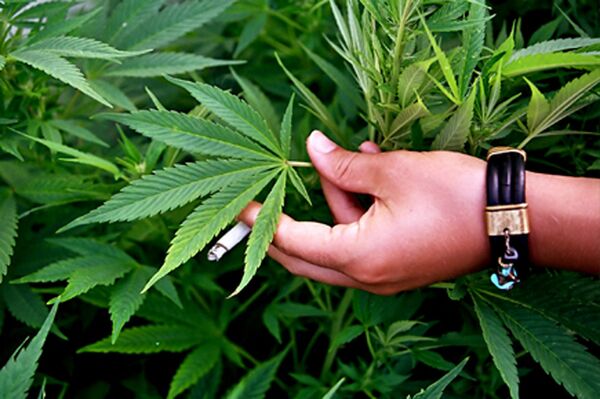WASHINGTON, November 10 (By Carl Schreck for RIA Novosti) - With an average altitude of around 6,800 feet (2,072 meters), Colorado is known as the highest state in the United States.
After Colorado residents legalized the recreational use of marijuana last week, tourists may start flocking to the state for a different kind of high.
Voters in both Colorado and Washington State passed ballot measures this week legalizing recreational marijuana, putting the states in direct conflict with federal laws banning possession, production and sale of the drug.
The newly minted initiatives raise the prospect that Colorado and Washington could become a hot destination for tourists looking to spark up, much in the way coffee shops offering marijuana and hashish have attracted an estimated 1 million tourists annually to Amsterdam.
In the Colorado ski resort of Aspen, the local newspaper published a headline Thursday suggesting the town might become known as “Aspendam.”
Both Colorado and Washington attract tourists—particularly outdoor enthusiasts—from other US states and from other countries. Colorado in particular is famous for its ski slopes.
It’s “very possible” that legal marijuana will draw tourists to these states, but not in the kind of numbers that would overshadow other forms of tourism, said Morgan Fox, a spokesman for the Marijuana Policy Project, which contributed $1.2 million to Colorado’s legalization drive—or around half the total funding.
“It’s something people do all over the country anyway,” Fox said.
The possibility that Colorado and Washington might become a haven for pot tourists will largely depend on how the federal government decides to respond to marijuana legalization in the two states.
Nanda Chitre, a spokeswoman for the US Justice Department, said in a statement earlier this week that the federal government’s designation of marijuana as an illegal drug remains unchanged. The Justice Department is “reviewing the ballot initiatives” in Colorado and Washington and has “no additional comment at this time,” Chitre said.
The governors of Colorado and Washington planned to speak by telephone on Friday with US Attorney General Eric Holder about the federal government’s intentions regarding the measures, The Associated Press reported.
The federal government is likely concerned about a possible domino effect resulting from legalized marijuana in the two states, said Robert Mikos, an expert on federal and criminal law at Vanderbilt Law School.
If neighboring states see that Washington and Colorado are bulking up their coffers with revenues from taxes on marijuana—in particular from pot tourism—they may find themselves under pressure to legalize the drug as well, Mikos said.
If it is not blocked, the Colorado measure would allow adults to legally possess up to one ounce of marijuana and up to six marijuana plants as of Jan. 5. Colorado legislators will have a year to draft regulations on the commercial sale of the drug.
Washington State legislators will also have a year to establish regulations on the commercial sale of marijuana, which will be overseen by the state’s liquor board. If the measure is not blocked, adults in the state can legally possess marijuana as of Dec. 6.
Al White, the head of the Colorado Tourism Office, said it is still too early to tell what impact the measure might have on tourism in the state.
“Just anecdotally, I think probably some people won’t come to Colorado because of the measure, and I think some people will come to Colorado because of it,” White said. “At the end of the day, I think it will be a push.”
White added that until marijuana is legalized by the federal government, Colorado is unlikely to encourage tourists to come to the state to get high.
“I don’t see my board of directors going toward any sort of marketing platform that would actively market an illegal activity,” White said.
Joe Fitzgibbon, a state legislator from the city of Seattle, said Washingtonians are excited about drawing tourists to the state to “spend money and help us build up our economy.”
Supporters of the measure are not concerned about a spike in petty crime resulting from a possible influx of pot tourists, Fitzgibbon said, noting that it will remain illegal to use marijuana in public or to be under the influence of marijuana in public.
“Being drunk in public is still illegal, and being stoned in public will still be illegal,” he said.
Vivian McPeak, who organizes Seattle’s annual Hempfest—a pot powwow for legalization advocates that attracts thousands of visitors every year—also downplayed suggestions by opponents of the measure that legal marijuana would spark a crime wave.
“It’s probably more of a threat to a bag of potato chips than to anyone else,” McPeak said.


